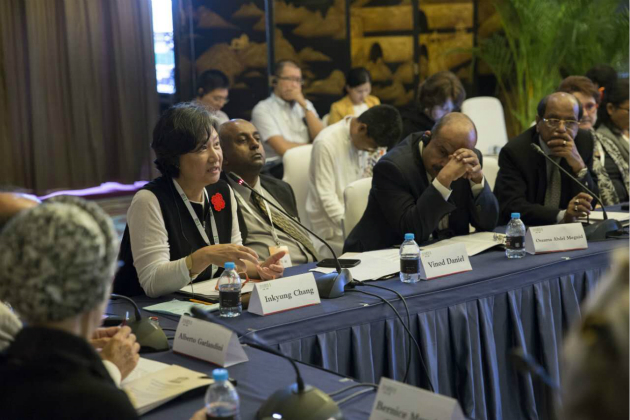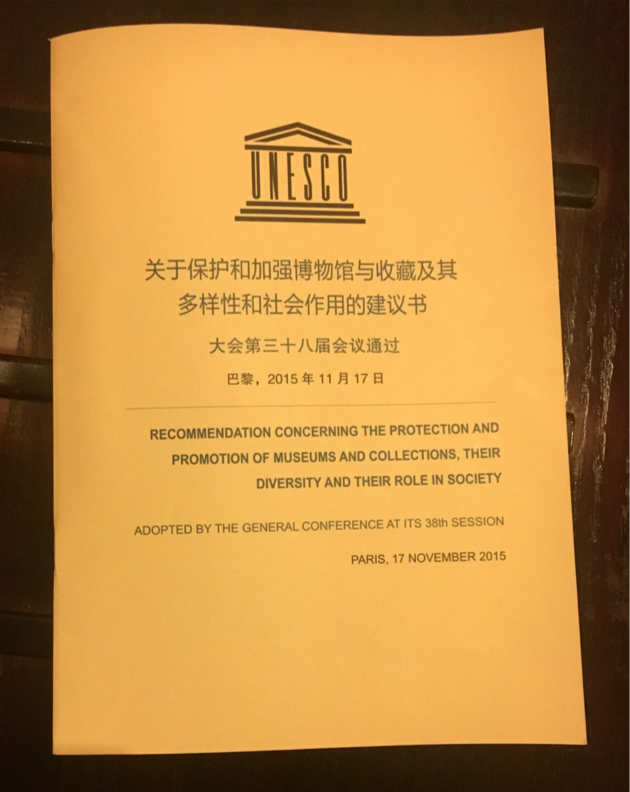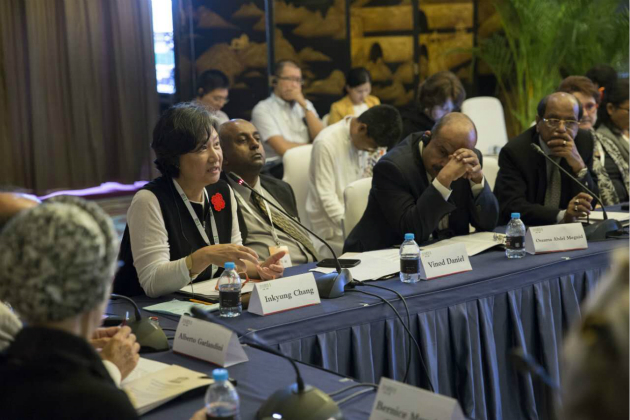International Museum High-Level Roundtable Conference held
- MPT-EXPO
- 2021-01-12 14:01
On the morning of September 17th, the International Museum High-level Roundtable was held in Chengdu Century City International Convention Center during the Expo. The conference focused on the theme of "how to implement the Recommendations on the Conservation and Enhancement of Museums and Collections, Their Diversity and Social Role" (hereinafter referred to as the Recommendations). Experts from 20 countries at home and abroad, including chairmen of the Association of Museums, museum curators, UNESCO officers and others, attended the meeting. The purpose of the meeting was to discuss the specific implementation methods of the Recommendation and to prepare the contents for the Shenzhen meeting in November.

The meeting
The Recommendation is an instrument on how to better play the role of museums in society adopted by the 38th General Assembly of the Member States of the International Organization for Educational, Scientific and Cultural Organization (UNESCO) in Paris on 17 November 2015. Although it is not binding, it is a guide of principles and policies applicable to different stakeholders. "Proposal" reiterated the museum to UNESCO conference of the 11th meeting (Paris, December 14, 1960) through the "about the museum the most effective measures of open to the public proposal, proposed the completion of the tasks of a effective role in promoting, but since 1960, have taken place in social economic and political influence the diversity of museum function and important changes.

Proposals
The Recommendations recommend Member States to implement, through legislation and other necessary means, the principles and norms set out in the Recommendations, in part as follows:
Overall policy
20. Existing estimates relating to cultural and natural heritage recognize the importance and social role of museums in the protection and promotion of such heritage and in their overall openness to the public. In this regard, Member States should take appropriate measures to enable museums and collections in territories under their jurisdiction or control to benefit from the conservation and publicity measures specified in the letters. Member States should also take appropriate measures to strengthen the capacity of museums to protect heritage in all circumstances.
21. Member States should ensure that museums implement the principles contained in the ICPQ. Museums are obliged to comply with the principles set out in international instruments for the protection and promotion of ignorant and intangible cultural and natural heritage. Member States should also adhere to the principles of combating illicit traffic in cultural property as set out in international instruments and should write similarly on this issue. Museums must also consider the ethical and professional standards set by the museum profession. Member States should ensure that museums fulfil their social role in accordance with the legal and professional standards of the territories under their jurisdiction.
22. Member States shall formulate policies and take appropriate measures to support and develop the Museums in accordance with their primary functions, to provide the human, intellectual and financial resources necessary for the proper functioning of the Museums, and to ensure the protection and strengthening of the Museums in the territories under their sub-jurisdiction and control.
23. The diversity of museums and their custodian heritage is their greatest value. Member States should preserve and enhance this diversity while Turkish museums should take advantage of the high quality standards established and promoted by the national and international museum community.
At the meeting, the UNESCO representative said museums are playing an increasingly important role in social development, such as promoting social integration, leading social innovation, promoting economic development, and respecting and safeguarding human rights. Ms. Hythia participated in the whole process through online video, calling on the participants to actively put forward their opinions and suggestions on the implementation methods of the Recommendations, and indicated that the briefing on the implementation work of the Recommendations would continue. Ms. Murphy believes that through UNESCO, direct dialogue with the museum authorities of member states can provide guidance in terms of policy formulation and financial support. Duan Yong, director of the Museum Department of the State Administration of Cultural Heritage, briefly introduced the development and changes of China's museums in recent years and the current situation, and said that in the future, museums will be guided to pay attention to the disabled and the elderly and other vulnerable groups, and build more museums with special features, so as to promote China's transformation from a large country of museums to a powerful country. At the free speech stage, the delegates spoke enthusiastically and put forward a lot of practical suggestions.
On the Chinese side, Guo Xiaoling, director of the Capital Museum, believes that the implementation of the Proposals should avoid extremism caused by "cultural diversity" and ignore the unity and universality of culture. Tian Kai, director of Henan Museum, proposed that in the process of implementation, it should cooperate with other institutions and strengthen the education and training of museum staff in poverty-stricken areas. Ren Wan, the deputy director of the Palace Museum, expressed his support and response to the Opinion Letter from the specific practices of the Palace Museum. Qiang Yue, director of the Shaanxi History Museum, said he hoped to get support from international experts in the preservation, protection and display of ancient murals.
Internationally, representatives from the United States, Japan, South Korea, Italy and other countries expressed that they would actively take various measures to promote and implement the Recommendations. For example, the "Proposals" will be translated into various languages and sent to the museum practitioners, and actively cooperate with relevant national departments to provide a good social development environment for the museum in terms of law and policy formulation. The representative of Nepal believed that the most important thing for developing countries was to solve the problem of food and clothing, but affirmed the important role of museums in human rights, social equity and conflict avoidance and hoped to explore practical and practical solutions. In addition, it is suggested to establish a professional advisory committee to guide the specific implementation work and continue to give more attention to museums and collections in terms of national policy guidance.
In November, the UNESCO High-Level Forum on the Implementation of the Recommendations will be held in Shenzhen. At that time, representatives from various countries and fields, including museum staff, government staff, young students and other representatives from all walks of life, will be present. The conference will last for three days, and several sub-forums will be held simultaneously. GuanQiang, deputy director of state administration of cultural heritage, said the Chinese government will vigorously support educational, scientific and cultural organization and the international association of each work, including through issued "proposal", held special training course, in China to carry out the work to promote the implementation of the "proposal", hope that the conference delegates to speak freely to help the upcoming high-level meeting in shenzhen.
Edit:77
Published Date: 2016-09-19
Recommended Content
News
-
----- In the Mid-Autumn Festival, Sichuan Museum invites you to take a journey of "family culture"
-
The 7th "Expo" successfully concluded a number of indicators to refresh the historical record
-
The Getty Leadership Institute and Museum High-Level Talent Program lecture was successfully held at the main venue of the 7th Expo
-
The 7th Chengdu Wuhou Ci Museum "World Expo" exhibition highlights grab fresh look
-
International Museum High-Level Roundtable Conference held
-
The Silk Road and Museums International Cooperation Forum was held
-
The seventh "expo" the main forum notice
-
The 7th China Museum and Related Products and Technology Expo has opened in Chengdu
-
The China-France Seminar on Digitization of Cultural Relics and Monuments was held in Chengdu
-
The State Administration of Cultural Heritage signed a strategic cooperation agreement with Chengdu Municipal People's Government


